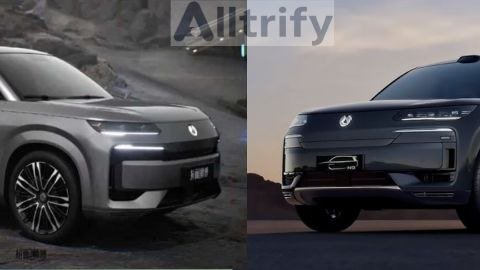Table of Contents
Introduction to BYD and Its EV Ambitions in India
BYD, short for Build Your Dreams, has established itself as a prominent player in the global electric vehicle (EV) market. Originating from China, BYD has rapidly expanded its footprint in the automotive sector, focusing primarily on sustainable transportation solutions. With a commitment to innovation and clean energy, the company has been at the forefront of developing advanced electric vehicles, including cars, buses, and trucks. Its reputation for quality and reliability has garnered considerable attention worldwide, positioning BYD as one of the leading manufacturers in the EV industry.
In India, BYD’s journey began with a focus on the commercial vehicle segment, where it introduced electric buses aimed at enhancing public transportation sustainability. This initial foray into the Indian market allowed BYD to establish a strong presence and develop a reputation for reliable and efficient electric commercial vehicles. Over the years, the company has strategically expanded its operations, adapting to the unique needs of the Indian automotive landscape. BYD has invested significantly in local manufacturing and technology development, aligning its goals with India’s vision for an electric future.
Recently, BYD has shifted its focus toward the passenger vehicle segment, recognizing the growing demand for electric cars in India. This strategic pivot marks a significant step in BYD’s ambitions within the Indian market. The impending launch of the Denza N9 electric SUV is a testament to this shift, encapsulating advanced technology and design tailored for Indian consumers. By catering to the evolving preferences of Indian car buyers and addressing the need for eco-friendly alternatives, BYD aims to position itself as a key player in the burgeoning electric vehicle sector in India.
The Significance of the Denza N9 in BYD’s Strategy
The introduction of the Denza N9 Electric SUV marks a pivotal moment in BYD’s strategic expansion into the Indian automotive market. As the global demand for electric vehicles (EVs) escalates, particularly for SUVs, BYD seeks to capitalize on this trend through its innovative offerings. The Denza N9 is designed not only to meet the rising consumer appetite for electric SUVs but also to highlight BYD’s commitment to sustainable transportation solutions.
By positioning the Denza N9 as a flagship model in India, BYD aligns itself with the increasing popularity of electric vehicles worldwide. This strategic focus on electric SUVs is particularly relevant given the growing preferences of Indian consumers who are looking for environmentally friendly yet versatile vehicles. The N9’s design, features, and competitive pricing further demonstrate BYD’s intent to capture a significant share of the market, aiming to appeal to both eco-conscious buyers and those seeking advanced automotive technologies.
Moreover, the Denza N9 serves as a testament to BYD’s robustness in research and development, showcasing their capabilities in creating high-performing, electric-driven SUVs. The model is equipped with cutting-edge technology and safety features that cater to the preferences of modern consumers. This commitment to quality is expected to enhance BYD’s reputation in India, thereby fostering consumer trust and brand loyalty.
Incorporating the Denza N9 into its product portfolio is a tactical move for BYD. It not only reinforces the company’s sustainable mobility objectives but also positions it as a formidable competitor in a market that is progressively leaning towards electric vehicles. The successful launch and acceptance of the Denza N9 could very well influence BYD’s future investments and strategies within the Indian automotive landscape.
Denza N9 Overview
The Denza N9 electric SUV represents a significant advance in the electric vehicle (EV) market, especially with its entry into India. This model showcases cutting-edge specifications that cater to the evolving needs of consumers seeking an eco-friendly driving option without compromising on performance. The Denza N9 boasts a length of 4,800 mm, a width of 1,890 mm, and a height of 1,650 mm, giving it a robust and spacious design. With a wheelbase of 2,900 mm, occupants can expect a comfortable interior that accommodates up to five passengers with ample legroom.
One of the standout features of the Denza N9 is its impressive electric range. The vehicle is equipped with a state-of-the-art lithium-ion battery pack, offering a driving range of approximately 600 km on a single charge. The advanced battery technology not only ensures extended travel capabilities but also includes fast-charging options that can return 80% charge in about 30 minutes, enhancing the convenience for users on the go. The combination of high-capacity batteries and an efficient electric powertrain allows for a remarkable performance that rivals many conventional SUVs.
In addition to its all-electric format, the Denza N9 is also available in a plug-in hybrid variant. This flexibility allows users to select an option that best suits their driving habits, whether they prefer the fully electric experience or a combination of electric and traditional combustion capabilities. Among its unique features are a sophisticated driver-assistance system, a panoramic sunroof, and a user-friendly infotainment system designed to keep drivers connected and informed. Overall, the Denza N9 emerges as a formidable competitor in the EV segment, reflecting BYD’s commitment to quality and innovation in India’s burgeoning electric vehicle market.
Design and Aesthetics: The Denza N9’s Exterior
The Denza N9 Electric SUV presents a compelling visual identity, showcasing a blend of modern aesthetics and functional design tailored for the Indian market. Its overall shape is characterized by a robust and dynamic silhouette that resonates with the growing trend among electric vehicles seeking to appeal to a diverse audience. The front face of the Denza N9 features a striking combination of sleek lines and bold contours, with a prominent grille that has been subtly adapted to reflect the electric nature of the vehicle, eschewing traditional combustion engine elements.
The design elements are meticulously crafted to ensure both visual appeal and aerodynamic efficiency. Influences can be noted from established models, such as the Land Rover Discovery, imbuing the Denza N9 with an air of sophistication while maintaining a rugged stance. The body lines are sculpted with precision, enhancing the overall aesthetics while improving airflow, ultimately contributing to the vehicle’s efficiency and performance. This attention to design detail not only ensures functionality but also elevates the SUV’s presence on the road.
Moreover, the Denza N9 offers a variety of color options that cater to diverse customer preferences, ranging from classic hues to more vibrant and contemporary shades. These choices allow potential buyers to reflect their personal style and embrace the eco-friendly image that comes with owning an electric vehicle. In summary, the exterior design of the Denza N9 embodies a perfect balance of elegance and practicality, setting the stage for what is poised to be a significant contender in the electric SUV market. With its captivating visual characteristics, the Denza N9 is expected to resonate well within the Indian automotive landscape, appealing to a wide array of consumers.
BYD’s In-house Battery Technology: A Game Changer
BYD has consistently placed itself at the forefront of electric vehicle innovation, and a significant factor contributing to this status is its advanced in-house battery technology. At the core of the Denza N9 Electric SUV’s performance and reliability lies BYD proprietary battery systems, which are engineered to enhance driving range, safety, and charging efficiency. By producing batteries internally, BYD maintains strict quality control and can integrate cutting-edge advancements more rapidly into its vehicles.
The Denza N9 is equipped with BYD lithium iron phosphate (LiFePO4) batteries, which are known for their excellent thermal stability and longevity. This technology not only helps in achieving a considerable driving range per charge but also minimizes the risks associated with thermal runaway, a common concern in electric vehicle batteries. The substantial range provided by these batteries ensures that drivers can confidently travel longer distances without the frequent need for recharging, thus addressing one of the major barriers to electric vehicle adoption.
Moreover, BYD commitment to innovation extends to charging options. The Denza N9 supports fast charging capabilities, allowing users to recharge their vehicles quickly and conveniently. This feature is particularly valuable in a fast-paced market like India, where charging infrastructure is still developing. Enhancing the user experience with efficient charging solutions reflects BYD understanding of consumer needs and market dynamics.
In light of these developments, BYD in-house battery technology serves as a game changer not just for the Denza N9 but for the entire electric vehicle segment. By prioritizing safety, performance, and convenience, BYD solidifies its position as a leader in the competitive electric vehicle landscape, catering effectively to the growing demand for sustainable transportation solutions in India.
Patent Filings and Market Launch Considerations
The recent patent filings by BYD for the Denza N9 electric SUV signify a strategic move in their efforts to penetrate the Indian automotive market. These filings are not merely administrative steps; they represent a crucial element in securing intellectual property rights essential for the OEM’s competitive advantage. Patent protection enables BYD to safeguard its innovative technologies while preventing imitations from rivals, thus laying a solid groundwork for its market launch in India.
Several factors must be taken into account as BYD contemplates launching the Denza N9. The regulatory landscape in India presents both opportunities and challenges. Compliance with local emission standards, centering on sustainability and environmental protocols, is crucial. In addition, the Indian government has been promoting electric vehicles (EVs) through various incentives, which may favorably impact BYD market entry strategy. However, navigating bureaucratic processes and regulatory compliance adds layers of complexity that could affect the timing of the launch.
Moreover, the competitive landscape cannot be overlooked. India has witnessed a surge in the interest of domestic and international manufacturers in the electric vehicle sector. Established players, such as Tata Motors and Mahindra Electric, already hold significant market share and brand recognition. BYD must conduct thorough market research to gauge consumer preferences and adapt its marketing approach accordingly. Understanding the pricing strategies of competitors as well as potential partnerships with local suppliers or technology companies will be integral in positioning the Denza N9 favorably within the current market ecosystem.
In conclusion, BYD patent filings for the Denza N9 establish a preliminary foundation for its entry into the Indian electric vehicle market. However, a successful launch will require a comprehensive analysis of regulatory requirements and an astute assessment of the competitive landscape to ensure sustainable growth and market presence.
A Look at BYD Competitors in the Indian EV Market
The Indian electric vehicle (EV) market is rapidly evolving, with various players vying for consumer attention and market share. Leading this competitive landscape are established automakers such as Tata Motors, Mahindra Electric, and international entrants like Hyundai and Kia. Tata Motors has made significant strides with its Nexon EV and Tigor EV, which have gained popularity due to their affordability and range. Mahindra Electric, on the other hand, is focusing on the eVerito and eXUV300 to tap into the growing demand for electric vehicles.
In the premium segment, Hyundai with its Kona Electric and Kia with the EV6 are setting benchmarks for technology and performance, appealing to a more affluent customer base. These brands are leveraging advanced features, extensive range, and brand loyalty, creating formidable competition for BYD as it introduces the Denza N9 into the Indian market. The Denza N9, with its blend of modern design and advanced electric capabilities, aims to carve out a niche but faces the challenge of brand recognition compared to these established competitors.
Furthermore, the Indian government’s push for an increase in EV adoption through incentives and infrastructure development presents both challenges and opportunities. While the landscape is competitive, BYD could benefit from these policies to expand its reach. The consumer preference for high-range and affordable EV solutions is a decisive factor. Therefore, BYD strategy with Denza N9 must focus on showcasing its unique features and superior technology to differentiate itself. In this crowded field, understanding the competitive dynamics will be vital for BYD to make inroads and establish a solid market presence within India’s growing electric vehicle ecosystem.
Consumer Reception: Expectations and Predictions
The entry of BYD Denza N9 electric SUV into the Indian market is poised to generate considerable interest among consumers, particularly given the growing trend towards sustainable and eco-friendly transportation options. The current trajectory of consumer preferences indicates a pronounced shift towards electric vehicles (EVs), driven by heightened awareness of environmental issues and government initiatives aimed at promoting clean mobility solutions. As consumers navigate their options, several factors will influence their reception of the Denza N9.
First and foremost, the performance specifications of the Denza N9 are critical. The electric SUV is expected to cater to the rising demand for efficient yet powerful vehicles, which promise a refined driving experience. With advancements in battery technology and electric motors, consumers have become accustomed to expecting long-range capabilities and rapid charging times from emerging electric models. Therefore, market reception will heavily depend on the Denza N9’s ability to meet or exceed these expectations, particularly when compared to established players in the Indian automotive sector.
Secondly, the price point will play a significant role in shaping consumer response. With growing competition in the EV segment, potential buyers are increasingly discerning about value and affordability. BYD’s strategic pricing of the Denza N9 will need to align with consumer expectations to ensure a favorable market position. Additionally, government subsidies and incentives for electric vehicles could further influence buyer decisions, making affordability a key component of the Denza N9’s reception.
Lastly, brand perception and after-sales service will significantly impact consumer confidence in the Denza N9. As a relatively new entrant in the Indian automotive industry, BYD will need to establish a trustworthy reputation encompassing quality, reliability, and customer support. As consumers become more educated about electric vehicles, their expectations for quality and service assurance will correspondingly rise, thus affecting the overall success of the Denza N9 upon its release.
Conclusion: The Future of BYD and Electric Vehicles in India
In recent years, India has emerged as a significant market for electric vehicles (EVs), marking a shift driven by increasing environmental concerns and government incentives. BYD’s entrance into India with the Denza N9 Electric SUV symbolizes not just a strategic move by the company but also a broader commitment to the Indian EV landscape. The Denza N9, with its competitive pricing and advanced features, is poised to attract consumers looking for sustainable transportation options. This expansion represents a critical step for BYD in establishing its brand presence, promoting the adoption of electric vehicles in the region, and addressing the growing demand for eco-friendly transportation solutions.
Furthermore, BYD’s investments in local manufacturing capabilities can lead to reduced costs and shorter supply chains, essential factors for any automotive company penetrating the Indian market. As regulations around emissions tighten, the Denza N9 could meet the expectations of environmentally-conscious consumers and government mandates alike. This strategic alignment with India’s evolving regulatory environment underlines the potential for BYD to accelerate the shift towards electric mobility in the country.
Looking ahead, the Indian electric vehicle market is anticipated to experience robust growth. Technological advancements will likely pave the way for improved battery performance, charging infrastructure, and overall vehicle efficiency. Continued collaboration between government bodies and automotive firms, including BYD, could catalyze more development. Moreover, public charging stations and incentives for consumers will play pivotal roles in accelerating EV adoption throughout India.
In conclusion, BYD’s introduction of the Denza N9 Electric SUV is not merely a new vehicle launch; it is a reflection of a broader transformation within India’s automotive landscape. The future of electric vehicles in India appears promising, with possibilities for innovation, regulatory support, and increased consumer awareness all converging to create a conducive environment for sustainable transportation.





